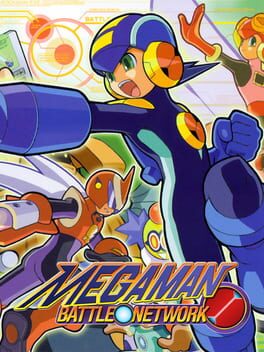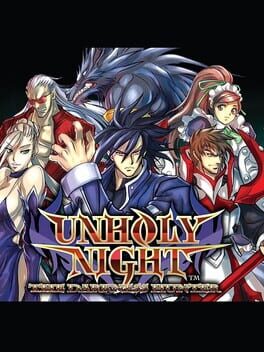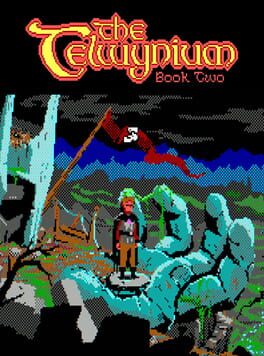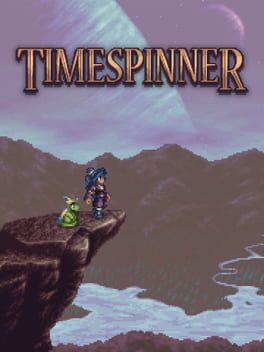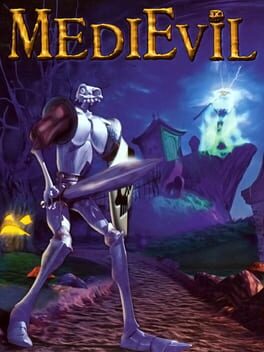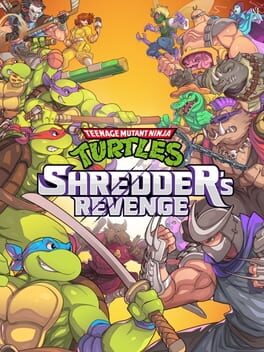ChaosFlameEmber
8 reviews liked by ChaosFlameEmber
Densetsu no Starfy
2002
You ever play an underwater platformer? That's what Starfy is, kinda the "Kirby of the sea", if you really want to draw a comparison between the two. Starfy brings a lot more to the table than you would think at a glance though. His Star Spin provides a great way to attack enemies while also being really fun to move around with. Despite being a game that consists almost exclusively of underwater stages (there's a bit of land platforming too), it hits a nice blend between puzzle and action.
The real highlight of Starfy is definitely the characters though. You meet a whole school of characters with quirky writing, fun personalities, and unique designs. The game stops to talk pretty often, but it never failed to make me smile. Their dialogue even frequently changes as you play the postgame, making their brief story arcs during the main game feel worth it.
Oh yeah, Starfy has a pretty beefy postgame to dig into. Every stage gets remixed obstacle layouts and new enemies. All of the side areas can actually get really tough, and the bosses get new tricks up their sleeves as well. I wish the game didn't completely kick you out of a level when you find a treasure, even if these extra rooms are usually one-way paths.
I think Starfy can pretty easily join the pantheon of "Nintendo characters that don't get enough recognition". Hell, you probably only know him as that one assist trophy in Smash Bros. Starfy deserves more respect than that! This game makes the ocean look like a paradise. Give me that over the nightmare fuel found in our own ocean's depths any day.
The real highlight of Starfy is definitely the characters though. You meet a whole school of characters with quirky writing, fun personalities, and unique designs. The game stops to talk pretty often, but it never failed to make me smile. Their dialogue even frequently changes as you play the postgame, making their brief story arcs during the main game feel worth it.
Oh yeah, Starfy has a pretty beefy postgame to dig into. Every stage gets remixed obstacle layouts and new enemies. All of the side areas can actually get really tough, and the bosses get new tricks up their sleeves as well. I wish the game didn't completely kick you out of a level when you find a treasure, even if these extra rooms are usually one-way paths.
I think Starfy can pretty easily join the pantheon of "Nintendo characters that don't get enough recognition". Hell, you probably only know him as that one assist trophy in Smash Bros. Starfy deserves more respect than that! This game makes the ocean look like a paradise. Give me that over the nightmare fuel found in our own ocean's depths any day.
Timespinner
2018
MediEvil
1998
Over the years this has always been one of those games that I'd play for a couple of hours before getting distracted and essentially dropping it, so I thought it was finally time to actually take the time to sit down and play through it, only to find that it's one of the best games I've experienced on the PlayStation. Medievil has such an unmistakeable sense of atmosphere to it that I can't really think of another game that manages to accomplish quite the same goal, with this gothic horror aesthetic being explored in tandem with this sense of dark humour that not only makes it all feel delightfully charming, but tends to give everything interacted with in the world an additional layer of context that makes it that much more fascinating to delve into. It feels like almost every decision that went into this game ties back around to building some aspect of the world, whether it's enemy design, obstacle layouts, or even the player's own mobility, and it makes for a deeply cohesive, singular experience that knows what it wants to be and accomplishes its goals masterfully.
The element of this game that stands out the most to me lies in the sheer variety and creativity of the level design and how it contributes to a rewarding sense of exploration. If you'd decide to rush through each stage only doing the absolute bare-minimum, you'll be able to clear almost all of these within about 5 minutes each, and yet the average experience ends up clocking in decently longer than that just due to how many little bits and pieces there are to experience within the majority of them. There tend to be a lot of little secret and optional things to do in each level, and while on their own each of these would still be very small, having a few of them being layered within each individual stage lends itself to things feeling as if you're always out looking for the next little reward for your time. This on its own would contribute to a good gameplay experience as is, but what truly separates the way the game handles its secrets is that at no point do these things feel particularly artificial, with each hidden area feeling as if it were properly thought out in both how it would contribute to the game's world itself and why it'd be hidden the way it was, a bit of design philosophy that is also translated into the objectives as well.
My favourite example of this is the sleeping village level and the way it predominantly revolves around a fetch quest where each element is perfectly understandable about why you're going to such lengths to get it. In a mad dash to find the hidden key to a safe that the mayor has hidden to stop the forces of evil from finding it first, you essentially run around a possessed village, not only finding all the components to get to the location of the key that the mayor hid but stealing from houses to fill in the additional gaps that were left with what he provided. It never feels especially contrived in how it’s presented to the player and adds a much richer sense of grounding to the world to further flesh out the wonderful dark fantasy it revels in.
Another interesting element in the level variety is the way it understands how to both come up with a ton of original scenarios not typically as prominently thought of in such a setting, while also knowing how to properly utilise the tropes it does have to keep things feeling familiar, yet with constant twists and turns. While there are some more standard things to see, such as a graveyard where the undead rise, a crystal cave with a slumbering dragon lurking within, and an overrun, ruined castle overtaken by the forces of evil, you also have some really neat ideas, like cornfields with possessed harvesting equipment, a dark, creepy ant tunnel, or even the inside of a castle sized steampunkish clock, with each stage bringing something unique to the table. While the core gameplay itself is definitely on the clunkier side, it’s this constant drip feed of new ideas and unique, atmospheric scenery that is the driving force of Medievil. No two levels play exactly the same and require you to use your limited core moveset in a surprisingly large number of ways to get through the various challenges thrown at you, aided even more by the vast array of weaponry that you accrue throughout your playtime.
While some might consider how weird and janky the movement is as a terrible thing, even this manages to tie in with the narrative on some level, seeing as you’re playing as a skeleton that’s been asleep for years who also hasn’t really ever been in a proper fight, it makes sense that you’d lack dexterity and would be swinging around a sword with all the grace of an elephant. This secondary element of the game not only being about taking down the dark lord, but also proving to all who surround you that you really are capable of great things works so well at bringing the perspectives between the player and Sir Dan closer together and only adds to the immersion.
The hall of heroes system adds a more tangible reward to all of this as well, being the primary way in which the player gains new weapons to use, making them not only have to find wherever a certain collectible is hidden in each stage, but kill enough enemies to activate its powers, rewarding those who choose to take their time without making it feel absolutely essential to do it with each stage, as you only need about 80% of them to unlock all the main upgrades, getting more minor stuff past that point. This ultimately matters very little for the feverish completionists who are collecting everything for the sake of it, but it means that for those who just want to get as strong as possible, they’re still able to skip fully exploring a few levels if any of them are not to their likings, helping things move along even smoother. Overall, Medievil is a janky, eerie masterpiece that crafts a near-constant feeling of wonder and spectacle with a healthy dose of comedy that never quite overpowers the oppressively bleak setting that you’re thrown into. There’s no shortage of pure creativity on display as you slowly uncover all the secrets of the evocative world of Gallowmere and I wish there were more games that managed to nail such a perfect atmosphere and cohesive sense of world design.
The element of this game that stands out the most to me lies in the sheer variety and creativity of the level design and how it contributes to a rewarding sense of exploration. If you'd decide to rush through each stage only doing the absolute bare-minimum, you'll be able to clear almost all of these within about 5 minutes each, and yet the average experience ends up clocking in decently longer than that just due to how many little bits and pieces there are to experience within the majority of them. There tend to be a lot of little secret and optional things to do in each level, and while on their own each of these would still be very small, having a few of them being layered within each individual stage lends itself to things feeling as if you're always out looking for the next little reward for your time. This on its own would contribute to a good gameplay experience as is, but what truly separates the way the game handles its secrets is that at no point do these things feel particularly artificial, with each hidden area feeling as if it were properly thought out in both how it would contribute to the game's world itself and why it'd be hidden the way it was, a bit of design philosophy that is also translated into the objectives as well.
My favourite example of this is the sleeping village level and the way it predominantly revolves around a fetch quest where each element is perfectly understandable about why you're going to such lengths to get it. In a mad dash to find the hidden key to a safe that the mayor has hidden to stop the forces of evil from finding it first, you essentially run around a possessed village, not only finding all the components to get to the location of the key that the mayor hid but stealing from houses to fill in the additional gaps that were left with what he provided. It never feels especially contrived in how it’s presented to the player and adds a much richer sense of grounding to the world to further flesh out the wonderful dark fantasy it revels in.
Another interesting element in the level variety is the way it understands how to both come up with a ton of original scenarios not typically as prominently thought of in such a setting, while also knowing how to properly utilise the tropes it does have to keep things feeling familiar, yet with constant twists and turns. While there are some more standard things to see, such as a graveyard where the undead rise, a crystal cave with a slumbering dragon lurking within, and an overrun, ruined castle overtaken by the forces of evil, you also have some really neat ideas, like cornfields with possessed harvesting equipment, a dark, creepy ant tunnel, or even the inside of a castle sized steampunkish clock, with each stage bringing something unique to the table. While the core gameplay itself is definitely on the clunkier side, it’s this constant drip feed of new ideas and unique, atmospheric scenery that is the driving force of Medievil. No two levels play exactly the same and require you to use your limited core moveset in a surprisingly large number of ways to get through the various challenges thrown at you, aided even more by the vast array of weaponry that you accrue throughout your playtime.
While some might consider how weird and janky the movement is as a terrible thing, even this manages to tie in with the narrative on some level, seeing as you’re playing as a skeleton that’s been asleep for years who also hasn’t really ever been in a proper fight, it makes sense that you’d lack dexterity and would be swinging around a sword with all the grace of an elephant. This secondary element of the game not only being about taking down the dark lord, but also proving to all who surround you that you really are capable of great things works so well at bringing the perspectives between the player and Sir Dan closer together and only adds to the immersion.
The hall of heroes system adds a more tangible reward to all of this as well, being the primary way in which the player gains new weapons to use, making them not only have to find wherever a certain collectible is hidden in each stage, but kill enough enemies to activate its powers, rewarding those who choose to take their time without making it feel absolutely essential to do it with each stage, as you only need about 80% of them to unlock all the main upgrades, getting more minor stuff past that point. This ultimately matters very little for the feverish completionists who are collecting everything for the sake of it, but it means that for those who just want to get as strong as possible, they’re still able to skip fully exploring a few levels if any of them are not to their likings, helping things move along even smoother. Overall, Medievil is a janky, eerie masterpiece that crafts a near-constant feeling of wonder and spectacle with a healthy dose of comedy that never quite overpowers the oppressively bleak setting that you’re thrown into. There’s no shortage of pure creativity on display as you slowly uncover all the secrets of the evocative world of Gallowmere and I wish there were more games that managed to nail such a perfect atmosphere and cohesive sense of world design.

